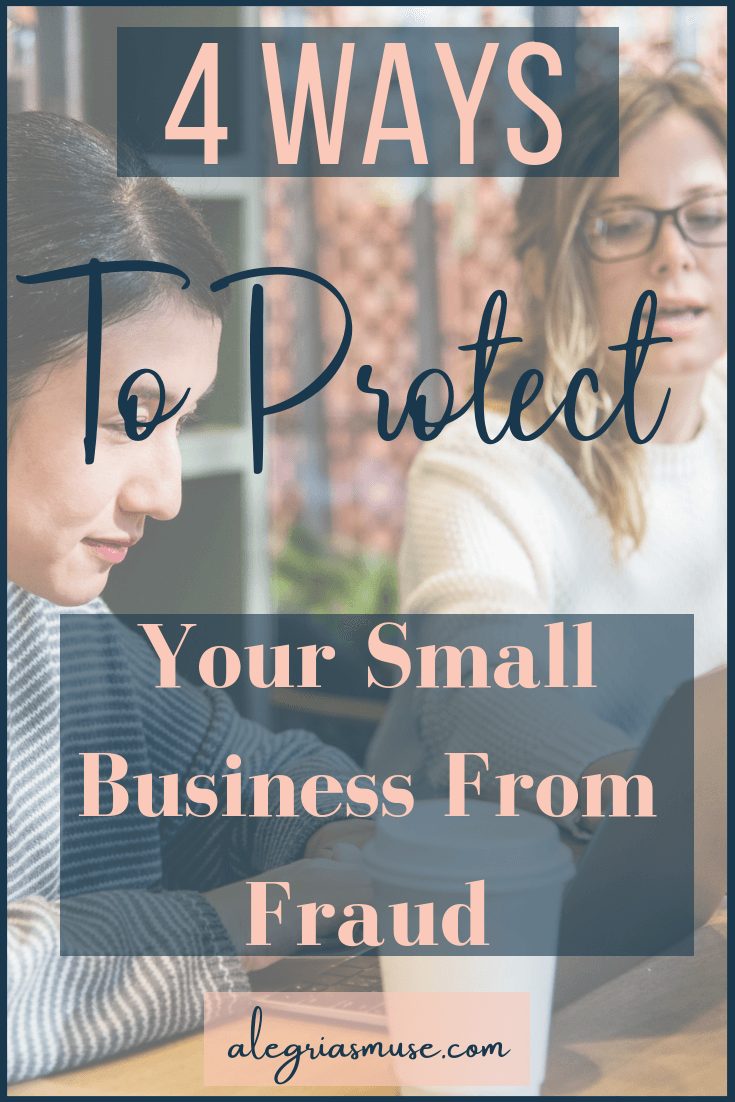Last Updated on November 17, 2018 by Jessica Adams
According to the Association of Certified Fraud Examiners, small businesses with less than 100 employees experience an average loss of $154,000 due to fraud. With this costly threat destroying businesses, you should aim to protect your small business from fraud. It’s important to put a plan in place to prevent fraud from happening at all. Here we’ll look at four different ways to protect your small business from fraud.
4 Ways To Protect Your Small
Business From Fraud

Keep a Close Eye on Your Bank Statements
![]() It is imperative that you and your accounting manager, both keep a close eye on your bank statements. You should cross-reference and check for any unusual activity as fraud could come from anyone and anywhere in the world.
It is imperative that you and your accounting manager, both keep a close eye on your bank statements. You should cross-reference and check for any unusual activity as fraud could come from anyone and anywhere in the world.
Recurring, unauthorized payments to an unknown establishment should also raise a red flag. And you should have one or more set of eyes monitoring your deposits, withdrawals, and other transactions consistently.
Your bank’s Fraud Dept is supposed to alert you of any strange activity on your business account. You’re also obliged to call the fraud department if you have any reason to believe there has been fraudulent activity on your account.
Backup & Shred Confidential Documents
 One important step you can take to prevent fraud in your business is to keep all business-related documents locked away or backed up on an external hard drive. This includes bank statements, credit card details, and federal tax ID numbers.
One important step you can take to prevent fraud in your business is to keep all business-related documents locked away or backed up on an external hard drive. This includes bank statements, credit card details, and federal tax ID numbers.
If a thief or hacker gains access to these documents, they could steal your business identity and apply for credit under your business name. Alternatively, they could also sell your personal information to other criminals.
With this in mind, be careful with how you dispose of confidential business information and always aim to shred confidential correspondence and financial records. This will make it difficult for people to decipher your business details, should they rummage through your trash.
Promote Safer Transactions
 In the US, 74% of all organizations have been exposed to either, attempted or real fraud. That is a really high number of direct or indirect “victims”. You should always be extremely careful over the transaction processes. Doing so is the easiest yet most surefire way to prevent fraud.
In the US, 74% of all organizations have been exposed to either, attempted or real fraud. That is a really high number of direct or indirect “victims”. You should always be extremely careful over the transaction processes. Doing so is the easiest yet most surefire way to prevent fraud.
Payment routes such as ValidCheck eChecks don’t require bank information to be exchanged between a business and its client. Using a secure, trusted payment process could prevent further fraudulent transactions. Also, by reducing access to your business account details, you’ll also prevent identity theft.
Train Your Staff to Prevent Fraudulent Activity
 Training your staff about suspicious activity which could be linked to fraud and how to prevent it, is also important. They should know when to alert you of anything unusual and have the knowledge to alert you when they see or hear suspicious activity.
Training your staff about suspicious activity which could be linked to fraud and how to prevent it, is also important. They should know when to alert you of anything unusual and have the knowledge to alert you when they see or hear suspicious activity.
When you train your employees about the potential risks to your business from fraud, the action can be taken on by them (and avoid going all the way the more official “fraud dept”). This training could also help to prevent and deter employees from committing crimes against the business themselves.
You should also train your staff to lock away, shred and dispose of confidential information correctly. They’ll also want to limit sharing business information over the internet and phone to customers. Finally, encourage them to ask clients for their ID if a customer is making a larger than usual transaction could prevent a fraudulent crime being committed against your business.
These are just a few of the ways you can help to decrease the risk of fraud to your business. Be cautious and curious of any unusual activity as fraud could come from anyone and anywhere across the world. It’s no longer relegated to just third parties who are unconnected to your business. It could be unsuspecting staff, suppliers and even customers that present the disaster of impacting your company.
Edited by Jessica Rose Adams





No Comments